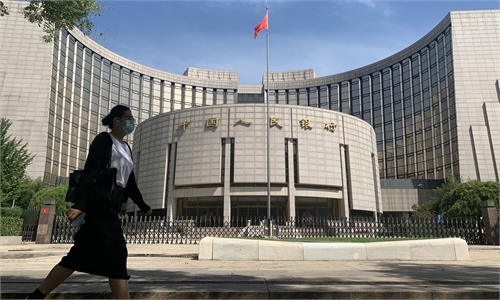Officials, scholars upbeat on high-quality growth trend of economy
More measures called for to elevate confidence and expand domestic demand

The 2023 Tsinghua PBCSF Global Finance Forum
China's economy has posted better-than-expected recovery so far this year, with market demand continuously picking up and economic growth rebounding, Chinese officials and scholars said during a weekend key forum. While acknowledging there are some short-term challenges like that the endogenous driving force is still weak and demand insufficient, they predicted the economy's long-term bright prospect and high-quality growth trend will remain unchanged.
Experts said domestic demand expansion is crucial for sustainable economic rebound, urging the authorities to come up with a slew of reform policies to elevate market confidence, expand effective social investment and cultivate new drivers for growth, especially consolidating the self-reliance and strength in science and technology.
"The Chinese economy follows a generally upward growth trajectory this year, and enters fast-lane of economic recovery," Wang Yiming, deputy head of the China Center for International Economic Exchanges, said at the Tsinghua PBCSF Global Finance Forum held in Beijing over the weekend.
The country's export growth has exceeded expectations, growing 10.6 percent year-on-year in yuan-denominated terms in the first four months in 2023. Consumption reported noteworthy rebound, with the retail sales of consumer goods surging 18.4 percent year-on-year in April. The investment sector maintains overall stability, while investment in manufacturing and infrastructure grew comparatively fast.
Currently, the key for the economy to steadily recover and pick up relies on the recovery and expansion of demand, Wang said, urging strengthened confidence and patience for sustainable economic recovery.
"Having been battered by the COVID-19 outbreak over the past three years, the Chinese economy will unlikely be restored overnight and the economic recovery will not repeat an old path," Wang said. "We should turn the process of economic recovery into a process of transforming the country's growth model, optimizing economic structure and cultivating new growth drivers in order to boost continuous rebound and start a new round of economic growth cycle."
Ding Zhijie, director of the Foreign Exchange Research Center of the State Administration of Foreign Exchange (SAFE), said at the same forum that the long-term bright prospect and high-quality growth trend of the Chinese economy will remain unchanged despite short-term challenges.
China's economic system as a super-large market is resilient, as the country's per capita GDP hovered above $12,000 in 2022 and the added value of China's manufacturing sector accounts for nearly 30 percent of global total, indicating continuous improvement in economic structure, he said.
In addition, China's monetary policies and macro-economic measures are independent, and make adjustments in line with domestic macro-economic situation and consumer prices. The long-term stable inflation level in China enables the country to maintain monetary policy autonomy amid the US and European countries' inflation tides, according to Ding.
Looking ahead, we project that China's nominal resident spending will reach 10 to11 percent in 2023, as the recovery of urban service activities, especially those of smaller enterprises, will help increase employment and residents' income, and the release of excess savings will also boost consumption recovery, UBS economists led by Wang Tao wrote in a research note they sent to the Global Times.
The economists maintained the forecast for China's GDP growth rate of 5.7 percent. "China's consumer price index (CPI) is expected to gradually rebound in the second half of the year, given joint effects of price rise in pork, services price rebound following economic reopening and lower base," they noted.
Showing confidence in China's development potential, international organizations and agencies like the World Bank and the IMF have also revised up their 2023 growth projections for China lately.
The UN launched the World Economic Situation and Prospects as of mid-2023 on May 16, updating China's growth forecast from 4.8 percent to 5.3 percent for 2023.
Policy support
In order to maintain long-term economic growth with a certain scale, efforts are needed for continuous improvement of the socialist economic system with Chinese characteristics, Wu Xiaoqiu, dean of the China Capital Market Research Institute, told the Global Times on the sidelines of the forum.
Only by restoring the confidence of consumers from the roots, could the Chinese economy enter a normal development track and showcase vitality and competitiveness, he said.
Meanwhile, Wang also suggested authorities should come up with a series of reform policies to elevate confidence of private enterprises and entrepreneurs and expand effective social investment, nurture new drivers of economic growth and boost foreign investment.
A meeting convened by the Political Bureau of the Communist Party of China (CPC) Central Committee on April 28 pointed to efforts in making proactive fiscal policy more effectual and prudent monetary policy more targeted and effective so as to create synergy for expanding demand. The guiding role of government investment and policy incentives should be well leveraged to effectively stimulate private investment.
The meeting also noted that China needs to consolidate the foundation of technological self-reliance and self-improvement, and cultivate new driving forces for growth.
Zhang Yansheng, chief researcher from the China Center for International Economic Exchanges, told the Global Times on the sidelines of the forum that it's urgent to raise the share of household disposable income in GDP, the share of consumer spending in GDP as well as the share of middle-income groups in the country's total population in order to expand domestic demand.
He said this could be done through measures including initial, second and third distribution systems, improvement in public services, employment priority policy and increase in population quality.
As for the prospect of China's foreign trade, Zhang expressed optimism despite weakening external demand and growing geopolitical tensions. "We should be confident of our government and private enterprises. The country's foreign trade is more resilient as analysts expected, and will blaze a path toward stable growth enabled by green economy and technologies," he said.


